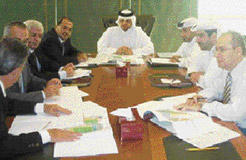Monday, October 17, 2005
International Day for the Eradication of Poverty
Today, October 17, is International Day for the Eradication of Poverty. That this Day has been observed since 1993 is telling – it speaks of the urgency to combat poverty for those that live along society's margins - social, economic and political, and it emphasises the role that developed nations are obliged to play in this global struggle.
The Arab Association for Human Rights (HRA) sees poverty as breeding an environment non-conducive to human rights. We believe that poverty constructs serious obstacles to the enjoyment of basic human rights, and leaves individuals within its grasp without basic human dignity; individuals living in poverty have only limited access to food, water and adequate housing.
The National Insurance Institute of Israel published a report last year which said that 54% of Arab children and 50% of Arab families live under the poverty line in Israel. This is the result of official policy that has brought about cuts to welfare benefits and other forms of social assistance, and only serves to further marginalise the poor – affecting most directly children and the elderly. These policies also exacerbate the divide between rich and poor; so much so that Israel, followed by the US, is currently the developed nation with the most number of people living under the poverty line.
The HRA feels that poverty warrants more urgency than, and should therefore be addressed before, sustainable development issues.
Currently, malnutrition seriously afflicts the Arab populations of Israel, in particular those that live in the Naqab (Negev) and in unrecognised villages. A direct result of malnutrition is the inability to enjoy the basic human rights of health, education and mental and physical growth. Left unresolved, the following generation stands to inherit the present generation's poverty and lack of basic human rights.
UNICEF declared that over 50% of children in the world currently live in poverty. Furthermore:
640 million lack adequate housing
400 million lack access to clean water
140 million children, for various reasons, are not in school
The HRA believes that all this is evidence of the failings of world governments. They have failed in implementing their international commitment to save the poor and children of the world and have failed to comply with their moral commitment to humanity.
This comes at a time when governments spend billions on weapons and hundreds of millions on wars that are immoral, and that to date have only exacerbated death, poverty, hatred, hunger and human rights violations in our world.
The above is a press release issued by the Arab HRA, jointly prepared by Mohammad Zeidan and me.
Palestine in Black and White. And Red and Green.
 -
- 
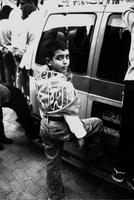 -
-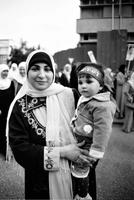
 -
- 

Top-down: Photos 1-7
Protesting Sheikh Yassin's assassination in Israel - Photos 1, 2, 3, 4
Ramallah Checkpoint - Photo 5
Ramallah's Future - Photo 6
Kids at an Arab HRA summer camp - Photo 7
Sunday, October 16, 2005
Between Kfar Manda and Sakhnin
Saturday, October 15, 2005
Hina Jilani's personal quest for really good falafel
'Human rights defenders' is a term used to describe people who, individually or with others, act to promote or protect human rights.
In regard to the Occupied Palestinian Territories, she wrote this, 'conditions and an environment which place human rights defenders operating in these areas at grave risk and presents serious obstructions in every aspect of their functioning.' (UN OHCHR Press Release, October 11, 2005). Although Israel was comparatively 'freer', she acknowledged the difficulties defenders face here. From Monday's meeting, 2 points immediately spring to mind:
- NGO-ers have bags, computers and other material in their possession probed when travelling abroad.
- Lawyers and their clients are refused privacy to confer with one another in prison; to confer they must use a phone (which is open to the risk of being tapped) and be watched over by prison guards (whom, word has it, are endowed with hearing faculties little seen in this part of the world).
Bottom line?
For really good falafel: must travel to Arab town
Wednesday, October 12, 2005
Qatar sponsors Arab-Israeli soccer team, Sakhnin
The president of the Qatar National Olympic Committee, Sheikh Tamim Bin Hamad Al-Thani, met yesterday in the Qatari capital Doha with an Israeli delegation led by MK Ahmed Tibi (Hadash-Ta'al) and Sakhnin mayor Mohammed Bashir to finalize the details of a $6 million donation to the Bnei Sakhnin soccer club.
Sakhnin is the only Arab Palestinian team in Israel's Premier Soccer League.
As recently as earlier this year, it was the only team without a home stadium.
Till today, it is the team that struggles most with finances.
But against all these odds, Sakhnin won last year's Premier League.
I only learnt about the team upon my arrival; but it hasn't taken me long to fall in love with them. Soccer is my game, and an Arab soccer team that makes it through with all the world's obstacles in place - wow. Respect. I look forward to watching a home-game in 10 days.
With regard to Qatari sponsorship of an Arab-Israeli team, I show support. There should be more support for Palestinian Arabs living within Israel. They're too often seen as 'collaborators' or 'Israeli' to warrant any help from Gulf nations. I appreciate Qatar's move and wish more GCC countries would see things in the same light. This community received Israeli citizenship by default (though some would disagree with the term) - either by not being forced off their lands by the Israeli forces or by not fleeing. Either way, the majority identify as Palestinian.
And no where did this show itself more publicly and collectively than in the October 2000 events. These events were a testament to how the struggles of Palestinians in the West Bank and Gaza were the struggles of Palestinians living within Israel; their issues are not the same, and it cannot be expected that they be, but their collective identity is Palestinian.
For more on Sakhnin and the urgency to show it support, I'll leave you with excerpts from Jonathan Cook's article, Arab footballers make Israeli history:
The team, called Bnei Sakhnin, are carrying aloft the hopes of the Jewish state... Israeli media has been arguing that the victory reflects a new atmosphere of coexistence between the country's Jewish majority and its one million Arab citizens... In fact, relations between Jews and Arabs have rarely been worse... One of the disturbing trends noted by Mossawa are racist chants at football matches, particularly since Sakhnin and another Arab squad, Nazareth, qualified for the premier division last season... In June the first football fan was convicted of shouting "Death to the Arabs" at a match in Jerusalem.
Certainly, Sakhnin needs all the help they can get. The only major team without a stadium, Sakhnin have had to use a scrap of cleared land among olive groves for training. Their municipality, like most other Arab councils, is deep in the red after decades of underfunding from the central government... Today, overcrowded Sakhnin is surrounded on all sides by a military base, an industrial estate and a string of luxury hilltop Jewish communities, which have been given control of the town's lands...
...apparently worried by bad publicity, Prime Minister Ariel Sharon stepped in to pledge $2 million for a stadium. The money is all very well, says Sakhnin engineer Kassem Abu Riya. "But where will Sakhnin find the land to build a stadium when we haven't the space for homes, let alone badly needed public facilities such as youth centres, recreation areas and proper schools?"
Monday, October 10, 2005
Pretty things need upkeep pretty often
It calls for a broom, a dustpan and something called effort. I usually manage to bring them altogether on a Sunday.
And here's why it's worth it
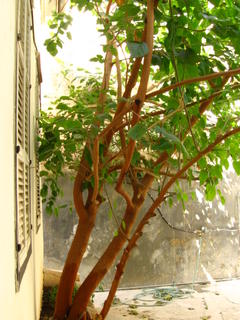
Friday, October 07, 2005
Political views from Haifa
Hamad was talking about how he interpreted being Palestinian Arab in Israel:
- Either you can go along with the crowd and voluntarily shed your Arab identity; this of course makes things easier for you in dealings with the police, the government and society in general.
- Or you can hold strong to your Arab identity and deal with its repercussions.
Hamad was about the latter, and for him that meant not voting in Knesset (the Israeli parliament) elections, even if Arab MKs (Members of the Knesset) were running. He felt it selling out; and a lot of people do... playing by Israel's rules is selling out to Israel.
Others, like 25 year old Yamen Al-Hijri, don't agree. Active in politics and an engineer by profession, he calls for his people to be smart. He stresses the importance of working with both options at hand - Arab and Israeli. He votes in the Knesset for Arab MKs and wishes that more would do the same. He also believes in an Arab Parliament being constructed within Israel so that issues tackling the Arab population are given focus.
He says that today Arab Palestinians make up 20% of the population so that they can't really afford not to play by the rules. However, once the dynamics change and the Palestinian population within Israel and the Territories is in the majority (2020 by some estimates), then the Palestinians will be in a better position to shape Israeli politics and see real change within their community.
Tuesday, October 04, 2005
Monday, October 03, 2005
The events of October 2000
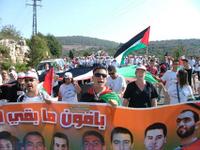
The events of October 2000 have etched themselves on the memories of the Palestinian Arab citizens of Israel as a time when those in charge could walk away with blind murder, literally.
October 2000 is marked by the killing of 12 innocent Palestinians living within Israel while they were protesting Israeli aggression in the Occupied Territories during the Intifada.
So on the 1st of October, as has happened over the last 5 years, a maseereh / march was organised to commemorate the deaths of the 13 (12 from Israel, 1 from the Territories). This year's march, which I attended, holds special significance because the authorities in charge of the investigation, the Mahash, recently published their conclusions. This final report found no one to be responsible in the deaths of the 13, and came after a state-sanctioned commission recommended criminal prosecution for specific officers.
Arab leaders point to institutionalised racism as being at the heart of the situation, as Arab Palestinians within Israel are increasingly being viewed as a demographic threat, and as Israel's fifth column.
